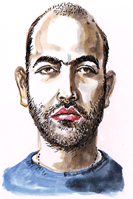

www.robertosaviano.it
"Maybe only silence really exists."
José Saramago
In my native stretch of land silence is a given, a necessary state of being. It is a daily practice. I come from southern Italy where in less than thirty years we have counted ten thousand dead. Silence here equates to the adage of minding your own business, and of course the capacity of bearing the burden. Fundamentally one must not say what one knows. Silence is the only true version of citizenship for the many millions who live in this particular part of the world.
I feel various silences: the silence of the media about facts that should instead be loudly told, even screamed, every day; the silence of institutions that through opportunism and fear leave us with no account of their actions; the silence that follows an ambush, just before the siren of the ambulance, just before the painful howl of somebody who, in that ambush, will lose a relative; the silence of morgues, while people wait for the results of autopsies; the silence of cemeteries, a silence that seems to last forever.
I know all these silences well, as if they were part of my family. Silence in my life, in its various shapes, has a lead role. My book Gomorrah exploded in Italy after many years of silence on the situation of mafia organizations. I mean here the silence of national and in turn international media. It is obvious that the local press in Campania, Sicily or Calabria is militant and continuously scrutinizes the business of criminal cartels and their iron links with regional economies. But this type of information is not too damaging for the mafia: as it stays localized, it fails to set off the spotlights, while the police have few resources and so the offenders cannot be brought to justice.
We must remember that the mafia, after the massacres of Capaci and Via D'Amelio, and the general indignation that resulted from those brutal killings, needed some restructuring. This was done – silently, of course – while public opinion, outraged but also mortally injured, went down the route of resignation and, even worse, indifference. It is by pure chance that Gomorrah, because of a word-of-mouth campaign, a push from below, unexpectedly sold an unbelievable number of copies. In October 2006 I received the first intimidations meant to reduce me to silence, stop me talking about how you live in an abandoned corner of the world – one of those places that we call peripheries, but that for their economic activities and turnover should rather be considered centres. Silently, the Camorra and 'Ndrangheta have established links with mafias all over the world: links with Mexican and Colombian narcos, with the very powerful former eastern bloc mafias. Silently small towns like Casal di Principe, Platì and Corleone, unknown places, have become central points in the Italian economy, with billions of euros exchanged every year. This comes at a cost not only to us. The damage that our silence produces in remote provinces of Chechnya or Nigeria are enormous. The results of this silence are the brutal assassination of Anna Politkovskaya, the homicide of Russian activist Natalia Estemirova and the summary execution of Ken Saro-Wiwa.
In my last three years of solitude, of forced exile, I have often found myself valuing my silence. The first thing you realize when an uncontrollable event takes you away from your normal life, is how much the surrounding sounds have changed. The ear has to recalibrate. Some noises have disappeared: those of your neighbourhood and your town, noises from which you would have never have imagined parting for long. At the same time some new sounds enter your life. Perhaps the blare of thinking becomes overwhelming, so that nothing else can be heard. Solitude makes you think about words you do not say, and those that are not said to you. My family, I imagine, would have loved to say a lot to me in these past years. There was a moment when a look had the flavour of: "Why did you do it? Why?" But nothing like that has ever been said. "Love me when I do not deserve it, because that is the moment I need it more" is a Neapolitan saying that I repeat to myself often, because a man in my condition becomes a worse man, not a wiser one. I might be wiser in my work, in what I write. But the man who lives badly becomes bad, and those close to me know that it is time to be silent. This is the moment when silence means comprehension.
I have got used to many silences. The silence of a town full of snow, where all sounds are dimmed; the silence of Stockholm, white like I've never seen a city before, where the thin air seems to freeze all thought. Then there are silences full of sun; in Jaffa, where I was invited by President Shimon Perez. The old town is almost attached to Tel Aviv and is deserted in February, with a light so strong on the white stone buildings that it seems to dull one's hearing. As the Talmud says: "If a word is worth a coin, silence is worth two." In this way I have encountered sweet silence, silence of reflection, calm and serenity; not just the silence of conspiracy, fear and submission. I have started moving in the realm of silence with agility, attempting to perceive its muted sound: the muted sound of proud human silence, repose and contemplation. But I cannot forget the cowardly and terrorized silence at the other extreme.
My new talent as tuner of silences might be a strange gift from this hellish life of mine.
Published by arrangement with the Roberto Santachiara agency.